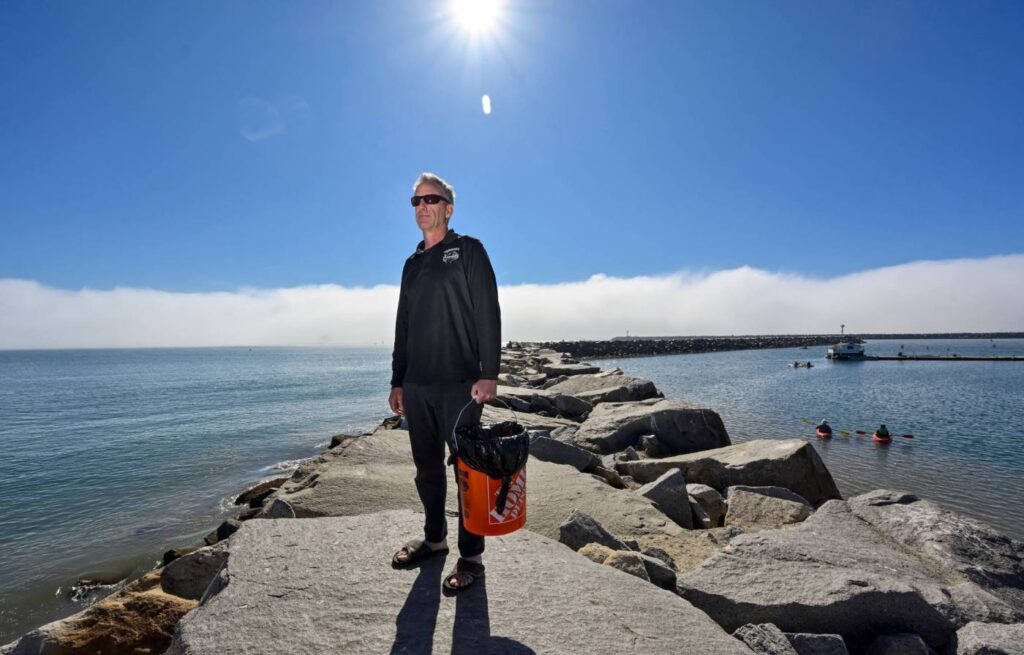
Gary Brighouse still sees the horrific scene: a weeks-old brown pelican lying dead, tangled in fishing line around its neck and feet.
“I just envisioned the mom and baby and how it all went down,” said Brighouse, who pilots boats for Capt. Dave’s Dolphin Safari and Whale Watching, based in Dana Point Harbor.
In his days at sea and in the harbor he’s witnessed other entanglements, too, and he regularly sends in photos and information to Laguna Beach’s Pacific Marine Mammal Center, which has rescued sick, stranded and entangled marine mammals for 50 years along the Orange County coast.
He came across the dead pelican about five months ago, just after starting his monthly effort to pick up discarded fishing line along the Dana Point jetty. The scenic spot is home to seabirds of all kinds, from brown pelicans to gulls, cormorants, and great blue herons. The jetty is at the mouth of the harbor, where hundreds of birds gather nightly along the rocks.
“It’s protected and they can see predators coming down,” Brighouse said.
The jetty is also where Brighouse started his effort to educate fishermen about why it’s not good to leave their lines lying around. They’re not biodegradable and can remain in the environment for a long time.
Fishing lines can permanently maim or painfully kill animals that get caught in them. But they also cause other problems. Boat propellers can get wrapped in them, as lines are often found around boat ramps, on piers and in fishing areas.
Brighouse’s monthly cleaning effort – and yes, he’s looking for more volunteers – is part of a statewide effort to recycle these potentially dangerous filaments.
California State Parks Division of Boating and Waterways and the California Coastal Commission manage the fishing line recycling program, which was started in 2011 and has 322 actively maintained stations statewide. Recovered lines are recycled into various products such as tackle boxes, spools for new line and even children’s toys.
So far, officials said, 2,447 pounds of line have been collected and recycled – an amount that if stretched out it would reach from San Francisco to Río Puré National Park in Colombia. Once the line is collected, it’s shipped to Iowa-based Berkley Fishing to be repurposed.
“The (Division of Boating and Waterways) and the Coastal Commission is grateful for partners like Gary Brighouse,” said Vivian Natuk, who oversees the program. She added that if fishing line is disposed of in trash bins it still goes to the landfill which creates the same hazards for sea birds and other wildlife.
When Brighouse was out at the jetty Thursday, he saw several fishermen who go there regularly and had no idea that there were recycling containers or that it was important for the line to be disposed into special containers.
He explained the importance of recycling.
“When they cast, sometimes the hook gets stuck in the jetty rocks,” Brighouse said. “Then they cut the line and leave it all there. So a hook and a long line. They don’t bother trying to dislodge the hook. The other fishing line they throw in the regular trash can, which goes to the dump and entangles birds at the dump.”
The state program has placed white recycling containers that look like pipes along piers, beaches, harbors and parks up and down the California coast. Locations include Ventura, Venice, Redondo Beach, Marina Del Rey and Oceanside.
In Orange County, the containers can be found in Dana Point Harbor along the jetty, the fishing pier, near the fuel dock and in the Harbor Patrol parking lot, and others are on piers in Seal Beach, Sunset Beach, Huntington Beach and Balboa in Newport Beach.
Often, fishermen and beachgoers aren’t sure what the containers are for and need education. That’s where volunteers like Brighouse step in.
“Whenever I’m out there, I inform fishermen,” Brighouse said. “I tell them how difficult it is to get an animal out, especially a 700-pound sea lion.”
He tells them how the line can cut through flesh, form a chokehold on animals’ necks and slice through flippers and tails.
Brighouse estimates he collects hundreds of yards of fishing line whenever he’s out at the jetty.
“I’m a very passionate animal rescue person,” the Irvine resident said. “I’ve seen baby whales entangled, and sea lions and sea birds; it’s a huge problem and a terrible way to die.”
